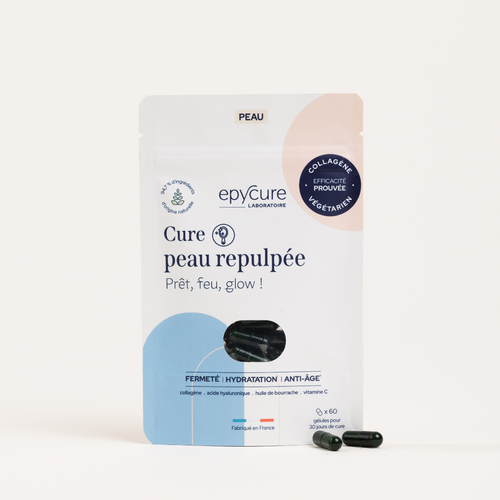From the age of 25, natural collagen production declines. The skin loses firmness and elasticity , and the first signs of aging appear.
Although collagen can be provided through food , its intake in the form of food supplements - particularly in capsules or powder - remains easier to integrate as part of a balanced lifestyle .
The question is how to choose the right one? We'll give you all the answers!
What is collagen? What is it used for?
Collagen is one of the most abundant proteins in mammals, including humans. It is essential for the formation of tendons , cartilage , connective and skin tissues, notably by ensuring the cohesion , elasticity and firmness of the skin by helping to delay the appearance of wrinkles and fine lines . It also plays a crucial role in many pathologies such as osteoarthritis and osteoporosis .
A key ingredient in anti-aging creams, collagen has many benefits for combating skin aging . Medical research has shown interest in it for many years, and more recently, in the field of nutraceuticals .
What are the different types of collagen for skin?
There are 28 types of collagen , each with specific structures and functions. Some stand out for their properties targeting cartilage or muscles , while others have an effect on the skin . Among them, five types are particularly widespread:
Collagen I
Type I collagen is the best known and also the most abundant in the human body: it constitutes more than 90% of the organic mass of bones and is the main collagen in the skin . Providing biomechanical properties such as firmness , elasticity and even the renewal of skin cells , it is mainly used for its anti-aging properties .
Collagen III
A major component of the extracellular matrix that makes up our organs and our skin, it is usually found in synergy with type I collagen to accentuate the effects of skin elasticity and firmness .
Type V collagen
This type of collagen is the main player in skin cell regeneration . It is widely present on the surface of cells, hair , and also the placenta for the creation of fetal skin.
Other types of collagen
Less well known than those mentioned above, we also find:
-
Type IV collagen , which helps build the different layers of the skin .
-
Type II collagen , the main component of cartilage , plays a role in the proper functioning of joints to prevent joint pain. To learn all about joint health, we invite you to read our article “ How to take care of your joints? ”.
What sources provide a good supply of collagen?
Bovine collagen
It is one of the most widely used sources of collagen in industry and comes mainly from the skin and bones of cows. It contains type I, II, and IV collagen. However, its use is controversial because animal sources could be linked to a risk of contamination with diseases such as BSE (bovine spongiform encephalopathy) or TSE (transmissible spongiform encephalopathy), which could be dangerous for everyday consumption.
Bone broth
We also find chicken bone broth, or bone broth , which is particularly rich in collagen. Made from type II collagen, it is considered a “fair” source since it is obtained from by-products of the food industry. Its form allows the intake of numerous minerals which, in synergy, will ensure hydration and skin elasticity properties or even prevention on joint health .
Marine collagen
Marine collagen is the most widely used source of collagen in the food supplement industry . Derived from fish skin or cartilage, it contains the same types of collagen as those found in its bovine equivalent (I, II, IV) but promises high biocompatibility and low immunogenicity , making it interesting in many applications, particularly in cosmetics, for tissue repair and healing.
Vegan and vegetarian collagen
There is no such thing as "vegan" collagen, strictly speaking, but only plant-based alternatives to stimulate its production. Vegetarian collagen , on the other hand, does exist: it is found in eggshell membranes , and more specifically type I and V collagen in large quantities, i.e. 30 to 40% of their mass.
In addition to being suitable for vegetarian diets, egg membrane collagen has the advantage of being just as effective as conventional collagens at lower doses , and has also demonstrated more than encouraging clinical results: +12% skin elasticity observed in a study involving 7 participants after 5 weeks of study. In addition, it has the particularity of being rich in hyaluronic acid , which is not the case with other sources of collagen.
Plumped skin treatment
Find this key active ingredient in our formula dedicated to skin beauty, the Plumped Skin Treatment , based on egg membrane collagen - rich in hyaluronic acid and elastin - in synergy with vitamin C and borage oil - the ultimate anti-aging active ingredient - but also vitamins A, E, B6, biotin and zinc to limit premature skin aging and promote hydrated , fresh and plump skin.
What are the criteria for good quality collagen?
Like many supplements on the market, not all collagen is created equal. Due to its growing popularity in recent years, the quality of some formulas sometimes leaves something to be desired in favor of the financial aspect. That's why it's essential to consider certain criteria when choosing good quality collagen .
Origin of collagen
Whether the collagen is of animal or plant origin, traceability is essential for transparency reasons and allows us to ensure its naturalness and origin , such as the type of animal breeding or fishing methods. In this case, choose marine collagen from responsible fishing (MSC Sustainable Fishing label).
Absorption & bioavailability
Naturally occurring collagen molecules are not well absorbed by the body. Its absorption is facilitated by prior hydrolysis, which cuts and produces small pieces of collagen , called “ collagen peptides ” or “ hydrolyzed collagen ,” which allows for better absorption due to their lower molecular weight than raw collagen.
Dosage criterion
“It’s all about the dose.”
The dosage of collagen will depend on the objective to be achieved. For beneficial effects on the skin , a daily dose of between 2.5g and 5g of marine collagen is required for optimal hydration and good maintenance of skin elasticity . A higher intake, from 10g to 20g per day, has shown beneficial effects on joint health , muscle mass and bones .
Although collagen is not considered dangerous, health recommendations recommend not exceeding 20g of collagen per day .
And the importance of diet?
They say nutrition is the center of good health and well-being. And it's true! Here are some foods that can naturally boost collagen production:
Lean meats and fish
Considered the most abundant source of amino acids , they provide proline and lysine which are essential elements for the formation of collagen.
Eggs
Thanks to their richness in amino acids , they provide a large quantity of proline , an amino acid which ensures the synthesis and resistance of collagen . The egg is also a good source of glycine , the most abundant amino acid in collagen which, in synergy with proline, helps increase the synthesis of collagen in the skin .
The lawyer
Rich in vitamin E , it slows down premature aging of the skin by preventing age-related loss of collagen.
Vitamin C
Naturally present in many fruits such as kiwi , orange , strawberries , as well as in green vegetables , vitamin C helps boost collagen production due to its action on the enzymes responsible for its biosynthesis. Furthermore, it is often associated with collagen to optimize its action and promote its assimilation.
Vitamin A
This vitamin is known for its role in wound healing . It is also involved in the formation of collagen through its effect on its specific enzyme, collagenase .
Ginseng
An adaptogenic plant , ginseng is also useful for preventing the degradation of collagen thanks to its antioxidant properties , which protect the skin against damage caused by UV rays, as well as the body against oxidative stress.



